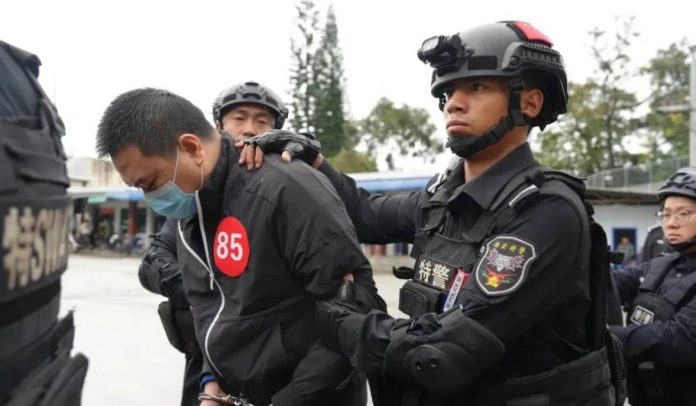In a recent and dramatic turn of events, the confrontation between Chinese authorities and cyber scammers in military-ruled Myanmar has escalated, marked by a violent shootout, high-profile arrests, and a renewed commitment to eradicate the criminal syndicates operating in border areas. The death of four Chinese undercover cops during an operation to apprehend cyber scammers inside Myanmar underscores the intensification of efforts against these criminal networks. However, the question that looms large is whether these actions are sufficient to root out the kingpins behind the extensive illicit activities plaguing the region.
China’s crackdown on online scams, particularly those operated by criminal syndicates along the Myanmar border, has gained momentum. The campaign involves shootouts, confession videos, and national TV broadcasts showcasing the arrests of high-profile suspects. Despite these efforts, the scope of the crackdown remains limited to specific areas, raising doubts about its effectiveness in dismantling the major players orchestrating human trafficking and fraudulent schemes that siphon billions of dollars annually.
Over the summer, joint operations between China and neighboring countries led to the repatriation of thousands of individuals who had fallen victim to promises of lucrative employment. Notably, these efforts did not target the kingpins operating in Myanmar, raising questions about the extent of collaboration between the nations in combating cybercrime.

Lu Jiantang, the vice-chair of foreign affairs in Wa, a region bordering Myanmar, emphasized that as soon as scammers are identified, they are handed over to the authorities. However, the focus seems to be on apprehending lower-level operatives rather than the influential figures orchestrating these schemes.
China’s Ministry of Public Security recently announced that northern Myanmar authorities had handed over around 31,000 suspects, including 63 key players in scamming groups. Notably, this collaborative effort with Myanmar has resulted in arrests related to powerful figures in the Kokang Self-Administered Zone and the Wa Self-Administered Division, both heavily influenced by China.
In mid-November, warrants were issued for four individuals surnamed Ming, members of one of the most powerful families in Kokang. The arrest of three suspects was shown on state broadcaster CCTV, while Ming Xuechang, a family patriarch and alleged leader of a scam syndicate, reportedly committed suicide during his arrest. This incident triggered a renewed determination by China to eradicate cyber scams in northern Myanmar.
The crackdown also targeted other influential families in Kokang, such as Wei Qingtao, who urged his relatives to release those forced into scamming rings. Videos featuring Liu Zhengqi, CEO of Fully Light Group, and Bi Huijun, son-in-law of Ming Xuechang, added to the spectacle of the campaign.
In late October, arrest warrants were issued for government officials in the Wa Division, demonstrating the broad reach of the crackdown. This joint effort has led to the expulsion of senior officials from the Wa Communist Party, emphasizing the severity of China’s stance against cyber scams.
The crackdown’s ripple effects have become intertwined with Myanmar’s ongoing conflict. The Three Brotherhood Alliance, comprising ethnic armed groups, launched an offensive against junta-backed forces in Kokang, aiming to eliminate both the military presence and the cyber scammers. This offensive has placed additional pressure on Kokang’s government.
Experts differ on the motivations behind China’s intensified crackdown. While some argue that it demonstrates China’s intolerance for scams, regardless of the perpetrators’ power, others suggest that it serves as a signal to deter such activities. However, skepticism persists about the comprehensive nature of China’s efforts, as some key figures, like Bai Suocheng, the military commander in charge of Kokang, remain untouched.
The crackdown may have increased the risks for cyber scam syndicates, but the pervasive instability and corruption in border areas provide fertile ground for these illicit activities to persist. Despite the challenges, the financial incentives driving these scams remain substantial, ensuring that the battle against cyber scammers is far from over.


